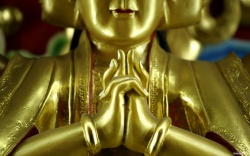Difference between revisions of "Shan-wu-wei"
Jump to navigation
Jump to search
(Created page with "thumb|250px| <poem> Shan-wu-wei [善無畏] (637–735) (PY Shanwuwei; Skt Shubhakarasimha; Jpn Zemmui) The {{Wiki|Indian}} monk wh...") |
|||
| (One intermediate revision by the same user not shown) | |||
| Line 4: | Line 4: | ||
[善無畏] (637–735) (PY [[Shanwuwei]]; Skt [[Shubhakarasimha]]; Jpn [[Zemmui]]) | [善無畏] (637–735) (PY [[Shanwuwei]]; Skt [[Shubhakarasimha]]; Jpn [[Zemmui]]) | ||
| − | The {{Wiki|Indian}} [[monk]] who first introduced [[Esoteric Buddhism]] to {{Wiki|China}}. [[Shanwuwei]] is his Chinese name. Born a prince in [[Udyana]] ([[Udra]] according to another account) in [[India]], he became king at age thirteen. He abdicated the throne, however, in favor of a jealous elder brother and entered the [[Buddhist Order]]. He studied [[Esoteric Buddhism]] under [[Dharmagupta]] at [[Nalanda Monastery]]. In 716 he went to {{Wiki|China}} and was welcomed by {{Wiki|Emperor}} {{Wiki|Hsüan-tsung}} of the {{Wiki|T'ang dynasty}}, who named him teacher of the nation. There [[Shanwuwei]] translated a number of [[esoteric]] scriptures, including the ([[Mahavairochana sutra]]) and | + | The {{Wiki|Indian}} [[monk]] who first introduced [[Esoteric Buddhism]] to {{Wiki|China}}. [[Shanwuwei]] is his {{Wiki|Chinese}} [[name]]. Born a {{Wiki|prince}} in [[Udyana]] ([[Udra]] according to another account) in [[India]], he became [[king]] at age thirteen. He abdicated the [[throne]], however, in favor of a jealous elder brother and entered the [[Buddhist Order]]. He studied [[Esoteric Buddhism]] under [[Dharmagupta]] at [[Nalanda Monastery]]. In 716 he went to {{Wiki|China}} and was welcomed by {{Wiki|Emperor}} {{Wiki|Hsüan-tsung}} of the {{Wiki|T'ang dynasty}}, who named him [[teacher]] of the nation. There [[Shanwuwei]] translated a number of [[esoteric]] [[scriptures]], including the ([[Mahavairochana sutra]]) and [[Susiddhikara sutras]]. |
</poem> | </poem> | ||
{{R}} | {{R}} | ||
[http://www.sgilibrary.org/search_dict.php www.sgilibrary.org] | [http://www.sgilibrary.org/search_dict.php www.sgilibrary.org] | ||
[[Category:Chinese Buddhist History]] | [[Category:Chinese Buddhist History]] | ||
Latest revision as of 13:19, 17 September 2013
Shan-wu-wei
[善無畏] (637–735) (PY Shanwuwei; Skt Shubhakarasimha; Jpn Zemmui)
The Indian monk who first introduced Esoteric Buddhism to China. Shanwuwei is his Chinese name. Born a prince in Udyana (Udra according to another account) in India, he became king at age thirteen. He abdicated the throne, however, in favor of a jealous elder brother and entered the Buddhist Order. He studied Esoteric Buddhism under Dharmagupta at Nalanda Monastery. In 716 he went to China and was welcomed by Emperor Hsüan-tsung of the T'ang dynasty, who named him teacher of the nation. There Shanwuwei translated a number of esoteric scriptures, including the (Mahavairochana sutra) and Susiddhikara sutras.
